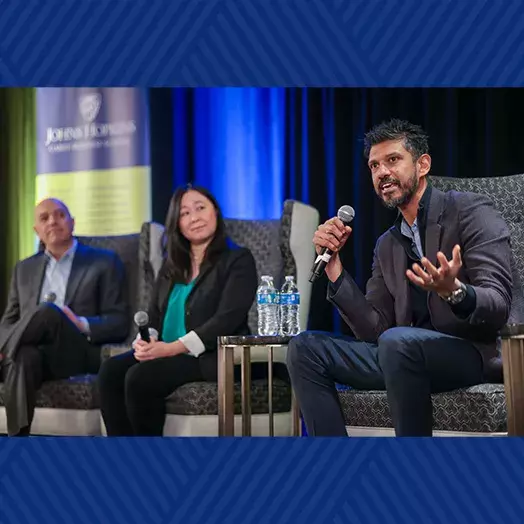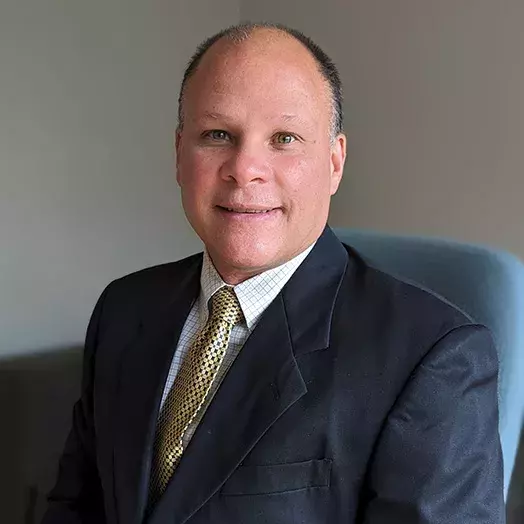
MS in Information Systems alum leads the nexus of IT and business
IT companies dominate the business landscape.
Indeed, the stereotype of an IT worker as a behind-the-scenes introvert no longer holds much weight when Apple, Samsung, and Google define the next trends not only in technology but in business as well. IT has made itself known as a pillar of global business. What comes next? Eric Jones (MS, Information Systems ’08) is helping define just that— the business of IT.
Jones started his career as a system engineer at Lockheed Martin. He worked hands-on with U.S. wartime activity after September 11 and provided real-time engineering support. But he started inquiring about the business side of the house: How were contracts decided on and built? How were other teams managed? He saw an opportunity to work closely with management to streamline resources and save lives.
“From a mission perspective, being innovative and streamlining processes, the outcome and result kept the war-fighter alive,” said Jones. “If resources weren’t aligned, it could cost a life. I wanted to be upstream in that decision-making process.”
"My passion is derived from how technology can change lives and ultimately make our world a better place to live. Technology is an essential component to solving the challenges that are facing our nation today.”
Eric Jones, MS, Information Systems ’08
While his IT technical prowess provides a foundation and language for him to guide clients, he was ready to move to a business executive role and drive decision making.
“At the beginning of my career, I was very technical. But there is a misnomer that people who have a passion for technology are only interested in coding or hacking their way onto the cover of Wired magazine,” Jones said. “My passion is derived from how technology can change lives and ultimately make our world a better place to live. Technology is an essential component to solving the challenges that are facing our nation today.”
Staying ahead of the field with an MS in Information Systems
Looking for the business skills to lead IT management, Jones began his MS in Information Systems.
He credits his Carey Business School courses with giving him real-world perspective and ideas to bring to his clients. In his Managing Complex Projects course, he learned how to quantify decisions and risks specifically from an IT perspective. He learned how to use a SWOT analysis (a business tool to analyze strengths, weaknesses, opportunities, and threats), which was a key framework leveraged while Jones worked as a senior cyber security advisor at Booz Allen Hamilton. As part of that role, Jones assisted chief information security officers evaluate the security implications of emerging technologies across the Department of Defense, Intelligence Community, NASA, and Department of Justice.
“When I was in school in 2008, cybersecurity was really starting to emerge. Even the cloud was a new concept. Johns Hopkins allowed me to use conversations about these emerging technologies in the classroom and bring those ideas and emerging technologies directly to my clients,” said Jones.
In technology, staying ahead of the field and in touch with emerging technologies can make or break a company.
Share this Article
“As a consultant, I was my client’s partner to manage risks, make decisions, and strategize things to come. Especially in defense, keeping them ahead of the game is my job. Without my master’s, I wouldn’t have been able to do that as effectively,” said Jones.
Jones added that he’s not out to be the best software developer, or network or cloud engineer. He wants to help his clients realize their mission and business outcomes through innovative IT solutions and mitigating IT risks.
His success is easy to see. He doubled his account value in his two years while working as a senior account executive at Gartner, a leading research and advisory company. And Jones was recently hired at AT&T as director of government business development— his fourth major promotion since graduating in 2008. Jones will lead AT&T’s efforts to support the defense and national security segment in providing unclassified and classified technology delivery and help defense and intelligence customers innovate their technology and communication systems.
Paving a road for the next generation of leaders
A leader in the IT business world, Jones is also a leader promoting diversity and inclusion in technology and STEM. He serves as a mentor in the Carey Business School Leading a Diverse Society program, a mentor-match initiative supporting Carey’s underrepresented part-time students.
“I have always informed my company how to connect with a diverse community. I always want to volunteer to be that bridge between academia and industry. I want to bring students into the network I’ve developed and expose them to a network they may not know about,” said Jones.
Jones has introduced his mentees to many of his own business connections and sets up virtual coffee chats to expose mentees to different career paths and opportunities.
Jones also credits his Leading a Diverse Society involvement with opening doors to secure himself a board seat at the Wendell Scott Foundation, a non-profit that provides mentoring, job skill training, and educational opportunities to underrepresented youth.
“Participation in the Johns Hopkins Leading a Diverse Society program meant something,” he said. “The Wendell Scott Foundation saw it and said, ‘We see you’re making an impact at Johns Hopkins. Can you help us, too?’”
For Jones, it’s not enough to just guide underrepresented students to STEM. To truly see gains for underrepresented communities, he wants STEM students to combine their love for technology with an eye for innovation to make a lasting impact and lead their fields.
“Through the non-profit work, we are steering students grades 7-12 into STEM,” said Jones. “At Johns Hopkins, I learned how to harness the entrepreneurial spirit around technology. That is the mindset and skillset that I want to pass on.”
This story was originally published on December 21, 2020



